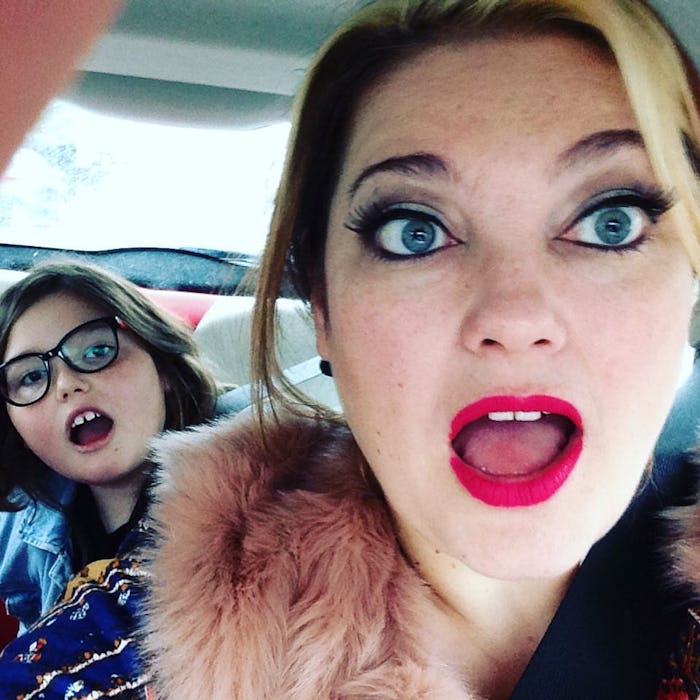
9 Subtle Ways You're Not Being Body Positive Around Your Daughter
Raising daughters to feel proud about their bodies is no easy task. Everyday girls are receiving layers of potentially negative messaging about how they should look. As a former sufferer of eating disorders, I try hard to be a body positive role model around my daughter. I monitor my own language and behavior very carefully, keen that history doesn’t repeat itself. But even I slip and partake in the many subtle ways you're not being body positive.
Old habits (particularly at times of stress) do creep in. When beauty stereotypes are so celebrated, it’s probably inevitable that I occasionally slip, and have days when I don’t feel great about what I see in the mirror. I try not to beat myself up about this. I understand on an intellectual level that I have been socialized to be dissatisfied with my appearance, what’s important is that I don’t pass this on to my daughter.
A mothers influence over her child is often unmatched and with great power comes great responsibility. A Harvard Medical school study of over five thousand girls between the ages 12 and 18, found that mothers who over-emphasize their concerns about body weight, are significantly more likely to pass on these attitudes to their children. The message is clear. When it comes to body positive parenting, it’s vital that the work begins at home.
Think you've got it licked? Here are some of the subtle ways you're not being body positive around your daughter, and how to combat these mistakes.
1You Use The Word "Fat" In A Derogatory Way
I have the cutest family dog; a pug called Mister Truffles. Recently on the recommendation of our vet he had to go on a restricted diet. When my little pug begged for food I would tell him off with expressions like “you are too fat” or “you need to slim down to be healthy.” I found myself doing this in front of my daughter and realized I was basically fat shaming our pet. Now I use positive expressions such as “you are on a different food so you live a long happy life”. My daughter will hear the word "fat" associated with being unhealthy and lazy every day — she doesn’t need to hear it at home.
2You Imply You Can’t Do Something Because Of Your Size
Automatically turning down opportunities based on weight, often stems from past hurt and humiliation. I know that I struggle to fit into some fair rides, but do I let this stop me taking my daughter to Disneyland? No way. When you imply that your body (or anybody else’s) is unfit for certain activities you are creating a template which is restrictive and non body positive.
3You Criticize Yourself In The Mirror
Sighing at your reflection teaches your daughter that poor body image is part of being a woman. Modelling a positive attitude towards your own appearance is an amazing gift to give your daughter. It’s the body positive version of a permission slip. It allows your daughter to be content with her own body too.
4You Watch Body-Shaming TV
Shows like the Biggest Loser or documentaries about obese people often encourage body shaming. Not a great influence for impressionable girl’s. Become a critical viewer of social and media messages so what’s on your TV is an informed choice.
5You Buy Magazines That Promote Unrealistic Body Image
The images of women presented in these magazines are narrow and confusing. But if you can’t quit your subscription, make sure you discuss the use of Photoshop, lighting, and make up with your daughter.
6You Equate Eating Certain Foods With Needing To Exercise
Keep exercise and food talk separate. Joking that you will need to hit the gym after eating a cake puts foods into good and bad categories. Girls are fast learners, but they are not critical thinkers. These are dangerous seeds to plant. Exercise should be promoted as fun, not a trade off for eating “naughty foods.”
7You Disassemble Food Into Fat, Carbs, And Calories
It's a parent's job to understand the nutritional values of a child’s food. Children don’t need to know how much sugar or calories an item contains, or to view carbs as bad. Offer balanced opinions if they are sought, but avoid over analyzing what’s on your daughter’s plate.
8You Compliment People For Losing Weight
Social conditioning encourages us to praise obvious weight loss, regardless of the cause, and eating success with thinness can lead to disordered eating. If you must compliment someone’s appearance, praise their kind eyes or beaming smile, not their new dress size.
9You Reward On People Based On Appearance Alone
It’s fine to say you think Angelina Jolie is a modern day Helen of Troy, but quantify it with her work as a UN ambassador. Focus on what people do, not what they look like. Praise non physical attributes and always reiterate that bodies come in all shapes and sizes.
Girls reap so many benefits from having a body positive mom. In a world that seems determined to tell her she is not enough, change your daughters optic lens so she realises females do not owe it to the world to be pretty.